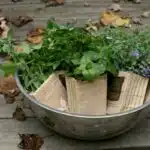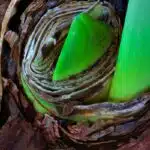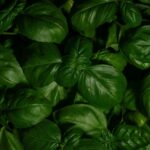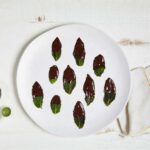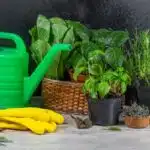Fresh herbs are the secret ingredient that can take a meal from ordinary to extraordinary. A few sprigs of rosemary, a sprinkle of chives, or a hint of oregano can turn an average dish into something truly delicious. But keeping fresh herbs around and storing them properly is not as simple as it seems. Fortunately, there is a way to keep your fragrant herbs at the ready without sacrificing flavor or freshness. With just a few simple steps, you can store your fresh herbs like a pro!
Herbs have been used for centuries in cooking, medicinal purposes and even some beauty rituals. From pungent sage to zesty dill, they add flavor and life to all kinds of dishes. But getting the most out of this culinary delight requires proper storage techniques so that their vibrant colors and flavors remain intact.
Whether you’re using homegrown herbs or buying them from the store, learning how to store them correctly can be the difference between enjoying their full flavor or ending up with wilted leaves and dull colors. Read on for our expert advice on how to keep your fresh herbs healthy and flavorful for longer!
What Herbs Can Be Stored
The fragrant aroma of freshly harvested herbs fills the air, inspiring a sense of calm and delight. Whether it be rosemary, thyme, or parsley, herbs can enhance any dish or beverage – but if you want to store them correctly, it’s important to know what types can be stored.
Herbs like basil, oregano, sage, and mint are easy to preserve. All these herbs are highly perishable and should be used within a few days of harvesting. But there are some that can last longer when stored properly. Parsley and cilantro will last for up to seven days in the refrigerator if placed in a plastic bag with some water; this will also keep them from wilting away quickly. Rosemary and thyme have an even longer shelf life; they can last up to two weeks when stored in the fridge in a sealed container with some damp paper towels.
For optimal flavor and freshness, it’s best to select fresh herbs that have vibrant colors and stems that aren’t wilted or discolored. And when storing them for later use, ensuring proper temperature control is essential. With just a few simple steps – such as placing your herbs in well-ventilated containers or bags – you’ll be able to enjoy their freshness long after they’ve been harvested…transitioning into selecting fresh herbs for cooking or baking.
Selecting Fresh Herbs
Selecting fresh herbs is like finding a treasure at the end of a rainbow. It can be difficult and time consuming, but when you finally find that perfect bunch of fragrant rosemary or that sturdy bunch of dill, it’s magical. You know you have something special to work with. But how do you choose herbs from the market?
The key is to look for herbs that are bright in color and full of life. If there’s any wilting or drooping, it’s best to leave them behind. The aroma should be strong, and the stems should be firm and unbruised. If there are any signs of mold, don’t take the chance; its best to just move on. It’s also important to take your time when selecting herbs so you get the most bang for your buck – literally!
Once you’ve chosen the freshest herbs possible, it’s time to transition into prepping them for storage. Washing and drying them properly will make sure they last longer in your kitchen while keeping their flavors intact.
Washing And Drying Herbs
It’s estimated that herbs are used in over 20% of all meals cooked in the United States. Clearly, keeping them fresh is critical for making delicious dishes. The third step in storing fresh herbs is washing and drying them.
After selecting the best quality herbs, it’s time to give them a good rinse under cool running water. Make sure to rub and check for any dirt or debris hiding between the leaves. When they’re clean, pat dry with a paper towel and gently shake any excess water off before moving on to the next step.
Fresh herbs should be stored properly right away — otherwise, their delicate nature won’t keep very long. To maximize longevity, be sure to remove any moisture from leaves before storing them in an airtight container or plastic bag with a damp paper towel. This will help keep your favorite herbs fresher for longer! With these tips, we can easily move onto preserving fresh herbs for even longer periods of time.
How To Keep Fresh Herbs
Once upon a time, there was an herb garden filled with lush, beautiful plants. The scents of rosemary, basil and thyme wafted through the air. But as the seasons changed, it was time to pick those herbs and prepare them for storage. This is where proper care comes into play.
Preserving herbs is key to maintaining their flavor and aroma. To ensure they stay fresh-tasting, it’s important to keep them cool and dry. Washing herbs thoroughly before storing them helps remove any dirt or debris that might cause them to spoil faster. After washing, make sure your herbs are completely dry before putting them away; if they’re still wet when you store them, they may get moldy more quickly.
To extend the shelf life of your herbs, consider storing them in airtight containers or plastic bags with as little air as possible; this will help prevent oxidation and keep moisture from building up inside the container. Make sure you label each container so you can easily identify what type of herb it holds; this way you can make sure you’re using the freshest ingredients for your recipes!
Proper Storage Locations
Proper storage locations are key to preserving the freshness of herbs. Different types of herbs require different storage solutions, so it’s important to know what works best for each kind. Generally speaking, herbs should be kept away from heat and light in order to maintain their flavor and texture.
It’s a good idea to store herbs like basil, cilantro, mint, oregano, rosemary, and thyme in an airtight container on the counter. This will keep them dry and away from direct sunlight which can diminish the flavor of the herbs quickly. Make sure to check the container periodically for signs of wilting or molding; if any is present, discard the herbs immediately and buy new ones.
For longer-lasting freshness, store parsley, sage and tarragon in a damp paper towel in a sealed plastic bag in the refrigerator. The paper towel helps retain moisture while also preventing molding or rotting from excess moisture buildup. Be sure to change out the paper towel every couple days for maximum freshness. With these simple steps you can ensure your fresh herbs stay flavorful for as long as possible.
Storing Fresh Herbs In The Fridge
The aroma of freshly-picked herbs can transport you to a beautiful garden. But fresh herbs are delicate, and if not stored properly, they will quickly lose their flavor and texture. If you plan to store your fresh herbs in the fridge, there are a few simple steps you need to take.
First, make sure that the herbs are completely dry before storing them in the refrigerator. Any moisture on the leaves will encourage mold growth and spoilage. To get rid of any excess moisture, you can either wrap the herbs loosely in paper towels or let them sit out for a few hours until air-dried.
Once the herbs have dried out completely, you’ll want to store them in an airtight container or resealable plastic bag. This helps prevent any moisture from getting inside and preserving their freshness for longer. Additionally, if you’re storing multiple kinds of herbs together, make sure to separate them into different containers so that their flavors don’t mix. By taking these simple steps, your fresh herbs should stay flavorful and fragrant for weeks in the refrigerator.
With these tips for storing fresh herbs in the fridge under your belt, now it’s time to learn about freezing your bounty for later use – another easy way to ensure your favorite flavors last throughout the months ahead!
Freezing Fresh Herbs
Have you ever wondered the best way to store fresh herbs? Freezing is one of the options that can be used to ensure that your herbs stay fresher for longer. This article will take a look at how to freeze fresh herbs effectively.
When freezing fresh herbs, it is important to select herbs that are in good condition and free from any signs of decay or wilting. Herbs should also be washed thoroughly prior to freezing in order to remove any dirt and debris. Once the herbs have been washed, they should be blotted dry with paper towels before being placed onto a baking sheet lined with parchment paper or wax paper. The herbs should then be placed into the freezer for several hours until they are completely frozen.
For best results, it is advisable to store the frozen herbs in airtight containers or plastic zipper bags as this will help keep them as fresh as possible for longer periods of time. Additionally, it is important not to overload the containers or bags as this could cause them to become freezer burnt quickly. By following these steps, you can enjoy freshly harvested herbs all year round! Transitioning now into the process of drying fresh herbs…
Drying Fresh Herbs
“Waste not, want not.” This old adage has been around for years, and it’s particularly true when it comes to fresh herbs. While freezing is an excellent way to store fresh herbs, drying them also provides a longer-term storage solution. Drying herbs is a simple process that will ensure you don’t waste any of your precious harvest.
Start by washing the herbs in cold water and patting them dry with paper towels. Next, cut off the stems and use kitchen shears to snip the leaves into small pieces. Place the leaves on a baking sheet or parchment paper and bake them at your oven’s lowest setting for several hours until they are brittle and crunchy. You can also hang bunches of herbs upside down in a cool, dry place for several weeks until they are completely dry.
Once the herbs have dried thoroughly, you can store them in airtight containers such as glass jars or plastic bags so they last even longer. Label each container with the type of herb it contains so you know what you’re reaching for next time you need one. With these simple steps, you can enjoy fresh herbs all year round!
Storing Fresh Herbs In Oil
Storing fresh herbs in oil is an effective way to keep them fresh for longer periods of time. The oil acts as a preservative and helps retain the flavor and texture of the herbs. It’s a great choice if you want to use them over multiple meals or save some for later use. To get started, you’ll need to prepare your herbs and then choose the right kind of oil for the job.
When preparing your herbs for storage, make sure they are clean and dry. You’ll also want to remove any stems or stalks from the leaves before adding them to your oil. Once you’ve done this, you can select an oil that has a high smoke point, such as avocado or almond oil. These types of oils can withstand higher temperatures without burning, so they’re great for storing herbs like rosemary and thyme that require heat to release their flavor.
Once you’ve chosen your oil, add it to a jar along with your fresh herbs, making sure that all of the leaves are completely submerged in it. Seal the jar tightly and store it in a cool dark place, such as in your pantry or refrigerator. This will help keep your herbs fresh for up to four weeks! With proper storage techniques like this one, you can easily extend the life of your favorite herbs and enjoy their flavors all year long. Next up, we’ll look at how storing fresh herbs in vinegar is another great option for preserving their quality and taste.
Storing Fresh Herbs In Vinegar
Storing fresh herbs in vinegar could be compared to a symphony of flavors. Like an orchestra, the combination of herbs and vinegar creates a harmony of fragrant and savory notes that will tantalize your taste buds. The key to success is to find the perfect balance between these two ingredients; too much of one can overpower the other and lead to an unpleasant experience.
To get started, select your favorite herbs – from chives to oregano – and combine them with white wine or apple cider vinegar. It’s important to note that you should not use an oil-based vinegar as this may cause discoloration or spoilage. Once you have chosen your herb and vinegar combination, add them into a clean jar with a tight fitting lid and give it a good shake until all the ingredients are combined. Allow the mixture to sit at room temperature for 12-24 hours before storing in the refrigerator for up to four weeks.
Using this method of storage, you can enjoy fresh herbs year round without having to worry about spoilage or waste. Plus, it’s easy enough for anyone to do at home! Whether you’re looking for something new to add flavor into your cooking routine or simply want an easy way to preserve fresh herbs, this method is sure to satisfy all your needs. This transition into salt-based preservation brings us ever closer towards our ultimate goal of flavorful freshness!
Storing Fresh Herbs In Salt
Storing fresh herbs in salt is a great way to extend their shelf life. Salt, when mixed with water, creates an environment that stops the growth of bacteria and fungi, which can otherwise cause herbs to rot quickly. It also helps to draw out the moisture from the herbs, making them last longer. To store fresh herbs in salt, mix one part salt and two parts water in a clean container or jar. Place the washed and dried herbs into this mixture and let them sit for up to 10 minutes before taking them out and patting them dry.
Herbs stored in this way can be kept at room temperature for up to two weeks – although it’s best to use them within a week for maximum flavor. Be sure to keep your jar covered so that no moisture gets into it, as this could make the herbs spoil faster. When you’re ready to use your stored herbs, simply take out what you need and rinse them with cold water before using.
Using salt is a great way to keep your fresh herbs around for longer – just make sure not to leave your herbs submerged for too long or they may start to lose some of their flavor and aroma. With just a little bit of effort, you can have delicious flavorful herbs on hand whenever you need them!
Storing Fresh Herbs In Butter
Storing fresh herbs in butter is an easy and effective way to make sure they last longer while still retaining their flavor. Butter works as a protective layer, sealing in the herbs’ essential oils and keeping them safe from oxidation and moisture loss. To store your herbs in butter, start by melting unsalted butter on the stovetop or in the microwave until it’s melted. Then add your chopped herbs, stirring gently so that all of them are coated with butter. Finally, spoon the herb-butter mix into an ice cube tray or mold and freeze for up to 6 months.
This process has multiple benefits. Firstly, it makes it easier to use small amounts of herbs at a time since they’re already portioned out into cubes or molds. Secondly, it allows you to create interesting flavor combinations when freezing multiple types of herbs together in one cube or mold. And finally, frozen herb-butter cubes can be easily added to dishes like sauces, soups or stir fries without needing additional preparation time.
Herb-butter cubes provide a simple way to keep fresh herbs around for long periods of time while preserving their delicious flavors. With this method you can always have flavorful ingredients ready when you need them without having to worry about them going bad too quickly. Plus, experimenting with different combinations is fun and may even lead to some new discoveries! Ready for more? Let’s move on to making herbal infusions for drinks and other treats.
Making Herbal Infusions
Making herbal infusions is a great way to make the most of your fresh herbs. Infusing herbs in oils, vinegars, and liquors can create delicious flavor combinations that you can use in a variety of ways. It’s easy – all you need are some glass jars, fresh herbs, and your chosen liquid.
Start by washing your herbs and removing any wilted leaves or stems before placing them in the jar. Then, fill the jars with your chosen liquid and seal tightly. Place the jars in a cool dark place for two to four weeks and shake them occasionally to help the flavors blend together. Once the infusion is complete, strain out the herbs and pour your infusion into bottles for storage.
Herbal infusions are an easy way to preserve your fresh herbs for future use while adding unique flavors to your cooking. You can also experiment with different flavor combinations to find something that suits your taste buds!
Tips For Storing Fresh Herbs
Imagine the fresh herbs in your kitchen as a bustling city. The busy leaves, stems and roots are the citizens of this city, just beginning to explore the possibilities of their home. As they go about their days, they need guidance on how to make their lives easier and more enjoyable. That’s where storing them correctly comes in!
Storing fresh herbs correctly is like providing an infrastructure for your herbal city-it ensures that its citizens can thrive. For example, if you wrap them in a damp paper towel and store them in a resealable bag or container with some air holes, your herbs will be able to breathe properly and maintain their moisture for longer. Additionally, if you place them in a glass jar or vase filled with water, they’ll be able to keep their shape better due to the humidity from the water.
The key is to provide your herbs with the right environment so that they can live happily and healthily for as long as possible. With these simple tips for storing fresh herbs, you can help your little herbal citizens have a happy life!
Troubleshooting Common Issues With Fresh Herbs
Storing fresh herbs can be a tricky task. If you’re having any issues, here are some troubleshooting tips to keep in mind. First of all, if your herbs are wilting or drying out quickly, it’s likely because they aren’t getting enough moisture. To rectify this, wrap them in a damp paper towel and store them in an airtight container in the fridge.
If your herbs have become slimy or moldy, it’s probably due to too much moisture or humidity. To fix this issue, spread the herbs on a paper towel and let them sit out for an hour to dry off. Then be sure to store them in an airtight container away from any sources of heat and light.
Finally, always check the herbs before use to make sure that they haven’t gone bad. If there are any signs of spoilage such as black spots or sliminess, discard the herbs immediately so that they don’t contaminate other food items. Taking these steps will help ensure your fresh herbs stay fresh for longer!
Frequently Asked Questions
How Long Can Fresh Herbs Be Stored?
Storing fresh herbs can be a tricky business. Take the case of Melissa, who was excited to pick up fresh herbs from her local farmer’s market. She had no idea how long she could keep them for and wanted to make sure they stayed as fresh as possible.
The good news is that there are a few simple steps you can take to extend the life of your herbs. First, you should try and store them in an airtight container in the refrigerator. This will help keep out moisture and preserve their flavor for longer. If storing in a plastic bag, make sure it’s well-ventilated so that excess moisture doesn’t build up. Additionally, you should never wash your herbs until you’re ready to use them—washing only speeds up the spoilage process.
When done correctly, fresh herbs can last anywhere from several days to several weeks depending on the type of herb and storage conditions. Herbs like basil, parsley, and cilantro will usually only last about 5-7 days whereas firmer varieties like oregano and thyme can last up to 2-3 weeks. Keeping an eye on your herbs regularly will help you determine when it’s time to replace them with a new batch.
With these tips in mind, Melissa now knows how to store her fresh herbs so they stay as flavorful and fragrant as possible for weeks at a time!
Can Herbs Be Stored In The Pantry?
Preserving produce often poses a problem. Pantries and refrigerators alike can quickly become overwhelmed with the bounty of fresh herbs. Can these aromatic ingredients be stored in the pantry?
The answer is—it depends. While some herbs are able to thrive in a dry, cool spot like the pantry, others require more attention to stay fresh. Parsley, for instance, will retain its flavor longer when stored in a damp paper towel and plastic bag in the refrigerator. Cilantro and basil are better off kept on the countertop or near a windowsill, where they can get some sunlight.
Thoughtful storage is key for making sure your herbs last as long as possible. To preserve their flavor and texture, it’s essential to find the right balance between temperature and humidity so your favorite spices stay fragrant and flavorful for days to come.
How Do I Know When Herbs Have Gone Bad?
Have you ever wondered how to tell when herbs have gone bad? Knowing when your herbs have passed their prime is essential for ensuring that your recipes get the flavor they deserve.
Storing fresh herbs is an important part of keeping them usable and safe for eating. When stored properly, herbs can last several weeks in the fridge or even up to a few months in the freezer. But how do you know when they’ve gone bad?
The first sign of spoilage is usually wilting, discoloration, and a change in texture. If you notice any of these signs, it’s time to discard the herb. You can also check the aroma; if it has lost its usual scent then it may be past its prime and not suitable for cooking with. Additionally, look out for any mold or bugs that might be lingering on the herb leaves – these are surefire signs that it’s time to throw them away!
The best way to make sure your herbs stay fresh is to use them soon after buying them and store them correctly according to the guidelines. Keeping an eye out for spoiling signs will help ensure that your dishes turn out delicious every time!
What Are The Best Ways To Extend The Shelf Life Of Fresh Herbs?
The tantalizing aroma of freshly-picked herbs can bring a dish to life, but all too often they don’t keep for long. What are the best ways to extend the shelf life of fresh herbs? With a few easy steps, you can make sure your herbs stay fresher for longer.
Imagine walking into your kitchen and being greeted by the fragrant scent of freshly-picked herbs. It’s one thing that makes cooking so enjoyable – but when that beautiful aroma fades, so does the flavor of your dishes. To prevent this from happening, there are a few simple things you can do to maximize the shelf life of your fresh herbs.
Start by gently washing them in cold water and lightly patting them dry with a paper towel or clean cloth. This will help remove dirt and other contaminants that could cause them to spoil more quickly. Then, wrap them loosely in damp paper towels and store them in resealable plastic bags in the refrigerator; this will help maintain moisture levels and reduce wilting. For an even longer shelf life, you can also chop up your herbs and store them in ice cube trays filled with olive oil or stock – these cubes will last up to three months in the freezer!
Preserving fresh herbs doesn’t have to be complicated; just follow these simple steps and you’ll be able to enjoy their delicious flavor for longer!
What Are The Differences Between Storing Fresh And Dried Herbs?
When it comes to storing fresh herbs, there are a few different methods that can be used. However, the key difference between storing fresh and dried herbs is the amount of moisture present. Fresh herbs need more moisture and should be stored in a way that will retain their moisture. On the other hand, dried herbs require less moisture and must be stored properly to prevent them from losing flavor or becoming too brittle.
One way to store fresh herbs is to place them in jars of water and keep them in the refrigerator. This method helps preserve the herbs for up to two weeks by keeping them moist. Additionally, you can wrap freshly picked herbs in damp paper towels and then store them in a plastic bag with holes punched into it so that air can circulate around the leaves. This method allows you to keep the herbs viable for up to one week.
In contrast, storing dried herbs requires different techniques than those used for fresh herbs. You should store your dried herbs away from direct sunlight, as exposure to heat and light will cause them to lose their flavor over time. It is also important to make sure they are sealed securely in an airtight container, as this will help preserve their flavor for longer periods of time. Finally, it’s best not to grind your dried spices until you’re ready to use them; grinding exposes more of the herb’s surface area, which increases its rate of oxidation and decreases its shelf life significantly.
Storing fresh and dried herbs properly is essential if you want them to last longer and remain flavorful for future use. With these tips in mind, you can ensure that your culinary creations will always have just the right amount of flavor!
Conclusion
Fresh herbs can be a great addition to a variety of dishes, and it’s important to know how to store them properly in order to extend their shelf life. With the right storage techniques and knowledge of when the herbs have gone bad, you can make your fresh herbs last longer. Properly stored, fresh herbs can be used for several weeks or even months.
On the other hand, dried herbs are more concentrated in flavor and have a longer shelf life than their fresh counterparts. While they may not have the same vibrancy as fresh herbs, they are much more convenient and require less maintenance.
By learning how to properly store both fresh and dried herbs, you can enjoy their flavor profiles all year long while making sure they stay as potent as possible. Whether you choose to use them in your next recipe or simply use a few sprigs as garnish, understanding the differences between storing fresh and dried herbs will help you get the most out of your ingredients.




